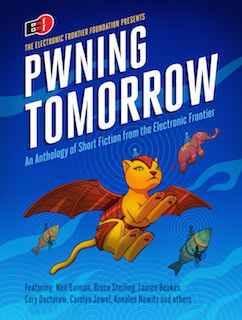 The Electronic Frontier Foundation is offering quite a Christmas present. “As part of EFF’s 25th Anniversary celebrations, we are releasing Pwning Tomorrow: Stories from the Electronic Frontier, an anthology of speculative fiction.” The anthology is offered at a range of suggested donation prices to support the EFF’s work, but it’s also available for free via direct download links on the same page. And the list of contributors includes such names as Cory Doctorow, Neil Gaiman, Eileen Gunn, Kameron Hurley, Rudy Rucker and Bruce Sterling.
The Electronic Frontier Foundation is offering quite a Christmas present. “As part of EFF’s 25th Anniversary celebrations, we are releasing Pwning Tomorrow: Stories from the Electronic Frontier, an anthology of speculative fiction.” The anthology is offered at a range of suggested donation prices to support the EFF’s work, but it’s also available for free via direct download links on the same page. And the list of contributors includes such names as Cory Doctorow, Neil Gaiman, Eileen Gunn, Kameron Hurley, Rudy Rucker and Bruce Sterling.
This is definitely an anthology with a purpose. As the EFF blurb explains, “we meet many speculative fiction fans in the course of our work to protect digital civil liberties, and the 21 stories in this collection inspire a sharper sense of the futures we may experience and the role of rights and freedoms there.” Furthermore:
It’s also important to know that writers have long been at the forefront of the fight against mass surveillance in the real world. Paranormal romance author Carolyn Jewel is the lead plaintiff in Jewel v. NSA, EFF’s long-running lawsuit against warrantless collection of electronic communications. Her novella, “Free Fall,” rounds out the collection.
Exactly how well the EFF’s agenda translates into fiction isn’t clear, but the lineup of authors is reassuring, and many of them have certainly touched on such themes in the past. George Orwell’s 1984 is probably the paradigm of how well a work of fiction can crystallize anxieties about the dystopian potential of technology, and has just as probably helped prevent at least some of that potential being realized. And outside the realm of fiction, Bruce Sterling’s The Hacker Crackdown: Law And Disorder On The Electronic Frontier is still regarded as an authoritative history of hacking, as well as an account of his own experiences on the digital frontier.
“Our member-supported, public interest work—whether impact litigation, advocacy, grassroots activism, or software development—relies on the kind of galvanizing foresight that only fiction can provide,” the EFF declares. It’s up to you whether you donate to them in this context – after all, there are plenty of other ways and times to donate to the EFF. But the mere existence of the work emphasizes yet again how science fiction and science fact have been intertwined since the days of Arthur C. Clarke, and how speculative writers are often society’s canaries in the coalmine over issues of liberty – digital or otherwise.
































